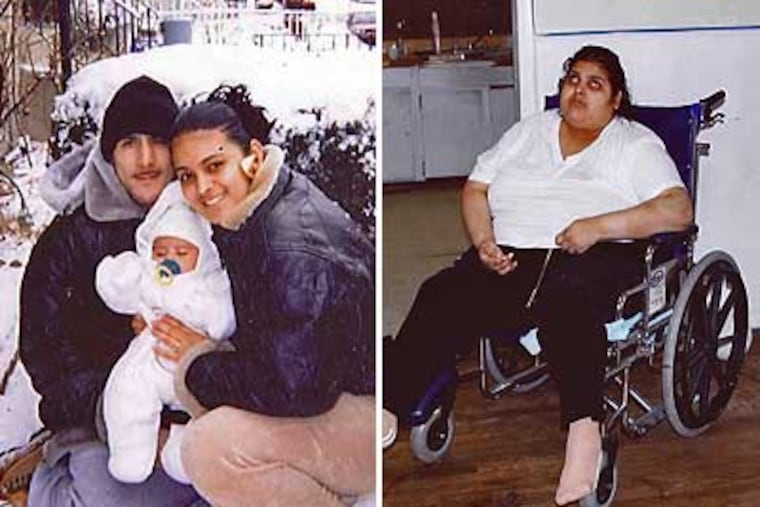$11 million verdict in malpractice
Yanira Montanez had a brain tumor when she arrived at the Episcopal Hospital emergency room in late March four years ago complaining of headaches and numbness, among other things. It was still there the next day when she went to the ER at Northeastern Hospital and the following day when she returned.

Yanira Montanez had a brain tumor when she arrived at the Episcopal Hospital emergency room in late March four years ago complaining of headaches and numbness, among other things. It was still there the next day when she went to the ER at Northeastern Hospital and the following day when she returned.
A simple CT scan would have revealed the tumor, but Montanez didn't get one on those three hospital visits because, her lawyer contended in an interview, the hospital knew it would be reimbursed just $135 by Medicaid for a procedure that cost thousands.
Yesterday, a Philadelphia jury decided that the three emergency-room doctors from those Temple University Health System hospitals were negligent in their care of Montanez, leaving her - at age 20, with a 4-month-old baby at the time - blind, paralyzed and brain-damaged.
The verdict: $11.2 million, including $5.9 million for future medical expenses that can be paid over time.
In the medical-malpractice suit against the ER doctors, the two hospitals, and the Temple health system, Montanez's lawyer, Kenneth M. Rothweiler, argued that the doctors failed to order a CT scan of her head despite symptoms that suggested a brain tumor, including nausea, vomiting, headaches, and periodic numbness in her arms, legs and face for three days prior to her first emergency-room visit.
"ER doctors have to listen and take the time to appreciate symptoms from patients to treat them appropriately," Rothweiler said. "In this case, for whatever reasons, they didn't do so and missed what were obviously neurologic problems that should have led them to order a CT scan."
Paul Wright, Temple Health's associate counsel, said he was disappointed in the verdict and was considering an appeal.
Wright said Montanez had a rare cancer that was difficult to diagnose, especially in a young and otherwise healthy patient. The challenge was made greater, he said, by a positive pregnancy test that suggested the reason for the nausea, vomiting and headaches.
"This is a needle-in-the-haystack diagnosis," Wright said.
"We feel badly that she has suffered all of these injuries from her very rare cancer," he said, adding that the ER doctors "treated her appropriately" and "none of her injuries are related to any failure of theirs."
The seven women and five men on the jury reached a different conclusion; one of the male jurors disagreed. (In Pennsylvania, only 10 jurors need to concur in civil lawsuits.)
The verdict was the third medical-malpractice award of more than $10 million this year in Philadelphia, as many as in the previous three years combined, according to Jury Verdict Research, a Palm Beach Gardens, Fla., firm that tracks and analyzes nationwide trends in personal-injury litigation. In February, a jury returned a $12 million verdict in a case involving breast cancer, and in May, a jury issued a $20.5 million verdict against a plastic surgeon in a case involving the death of an 18-year-old college student following a liposuction procedure, the company says.
Yesterday's case dates to March 23, 2004, when Montanez, of North Philadelphia, was taken to the ER at Episcopal Hospital after three days of symptoms. She was treated with medication to help her nausea symptoms and discharged, according to court records and trial testimony.
The next day she went to Northeastern with similar symptoms that included arm, leg and facial numbness. Again she was treated with a "cocktail" of medications to help relieve her gastrointestinal symptoms, medical records and testimony at the trial show.
On the third ER visit in three days, the doctor who treated Montanez testified, he determined the likelihood of a brain tumor was "very very low."
The following day, March 26, Montanez passed out and fell down stairs at her home; her lawsuit alleged it was a consequence of the brain tumor that could have been treated if, on either of the previous days, a CT scan of her head had been performed.
Subsequently, Montanez was treated at Temple University Hospital.
While pleased with the verdict, her attorney said it highlights a bigger issue of economic discrimination. Montanez's health coverage was through Medicaid, which would pay Temple about $135 for a CT scan that cost more than $3,000.
"People on Medicaid don't get the same treatment in the emergency room as people with private insurance," Rothweiler said in an interview. "Anybody with those symptoms and a Blue Cross Blue Shield card or comparable insurance would have been CT scanned on the first visit."
Temple's Wright strongly disputed that contention.
"What is more troubling to us in this case is the fact the plaintiff's counsel would introduce issues of ethnic discrimination and discrimination based on insurance status," Wright said. "Temple has more Medicaid patients than anyone in the commonwealth of Pennsylvania."
Montanez currently lives near Boston with her mother, uncle, sister, four brothers, and a 4-year-old daughter born just four months before the brain tumor was discovered. She needs the help of her family to take care of herself and her daughter.
The verdict might enable her to pay for the 24-hour-a-day care she needs and to move back to Philadelphia and dream of building a better future for herself and "my little princess," she told the judge during the trial.
"I want . . . to see if I could go to college or go to a trade school or something."